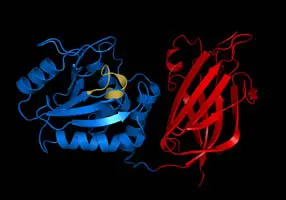Genetic defects that lead to cancer can basically be classified in two groups: defects that turn growth-promoting genes into permanently activated “cancer genes" (oncogenes), and defects that cause a growth-inhibiting gene, or tumor suppressor, to lose its functions.
Every cell contains multiple tumor suppressors; some have been found to undergo mutations in numerous types of cancers. One of these is the phosphatase PTEN, an enzyme which is often defective in cancers such as glioblastoma, prostate cancer and leukemia. In these cases it loses its capacity to repress growth and promotes the development of cancer.
“We always believed that a PTEN defect causes blood stem cells in the bone marrow to divide infinitely, and that this leads to leukemia," says Prof. Andreas Trumpp, a stem cell expert. Trumpp is head of DKFZ’s Division of Stem Cells and Cancer and director of the Heidelberg Institute for Stem Cell Technology and Experimental Medicine (HI-STEM), which is supported by the Dietmar Hopp Foundation and DKFZ.
To verify this hypothesis, Melania Tesio, a coworker in Trumpp’s laboratory, bred mice in whose cells the scientists could “switch off" the production of PTEN in blood stem cells and their descendants. Animals whose PTEN production had been turned off developed enlarged spleens and showed signs of a precancerous phase of leukemia known as myeloproliferative syndrome. Ultimately they developed various types of blood cancer.
The researchers were surprised, however, to find that cell division in the blood stem cells was not increased, as they had expected. Instead, they discovered that levels of a cellular messenger called G-CSF (granulocyte colony-stimulating factor) were much higher than normal. This messenger, which is also produced in small amounts in the granulocytes of normal animals, is known to “mobilize" blood stem cells; they leave the bone marrow and migrate through the body. This is exactly what happened in PTEN-negative animals: Blood stem cells leave the bone marrow and settle in the spleen.
Is the excessive production of G-CSF really responsible for the migration of blood stem cells into the spleen? The DKFZ researchers examined this in experiments with mice whose cells are unable to produce both PTEN and G-CSF. In these animals, blood stem cells remained in the bone marrow, and the animals did not develop myeloproliferative syndrome.
“This proves that the overproduction of G-CSF in PTEN-mutated granulocyte cells is what causes blood stem cells to migrate," says Andreas Trumpp. “G-CSF not only mobilizes stem cells, but also has an effect on the granulocyte cells themselves by inducing them to divide. This double effect on stem cells and granulocytes sets off the progression toward leukemia. The disease therefore develops along an indirect path, rather than by a defect in the PTEN tumor suppressor that drives stem cells to multiply, as previously assumed."
Melania Tesio, Gabriela M. Oser, Irène Baccelli, William Blanco-Bose, Hong Wu, Joachim R. Göthert, Scott C. Kogan, and Andreas Trumpp: Pten loss in the bone marrow leads to G-CSF–mediated HSC mobilization. Journal of Experimental Medicine 2013, DOI: doi:10.1084/jem.20122768
